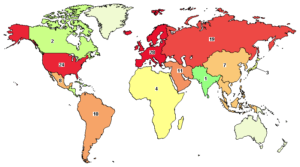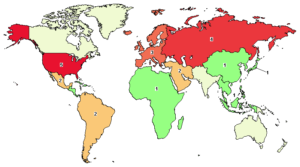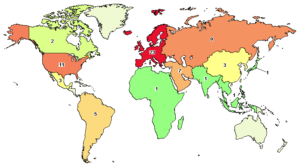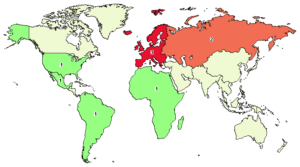Complicated Urinary Tract Infection & Acute Pyelonephritis – Clinical Trial Feasibility

A Complicated Urinary Tract Infection (cUTI), a severe class of UTI, one of the most common infections in the world, is notorious and recognized as a menace globally. cUTI has relapsing and refractory characteristics and is sometimes life-threatening because of patient predisposing factors as well as the recent worldwide spread of multi-drug resistant bacteria.

Pyelonephritis – infections of the kidney, occurs between 20–30 times less frequently, but can be a part of cUTI. They are one of the most common hospital-acquired infections accounting for approximately 40%.
What is Urinary Tract Infection?
A Urinary Tract Infection (UTI) is an infection that affects the part of the urinary tract. When it affects the lower urinary tract it is known as lower UTI, e.g. a bladder Infection (cystitis), and when it affects the upper urinary tract it is known as kidney infection (pyelonephritis).
Among the most common infectious diseases, Urinary Tract Infections (UTIs) are commonly encountered diseases by clinicians in developing countries with an estimated annual global incidence of at least 8.3 million doctor visits yearly.
What makes Urinary Tract Infection Complicated to Treat?
Complicated UTI is associated with a condition, such as structural or functional abnormalities of the genitourinary tract or the presence of an underlying disease, which increases the risks of acquiring an infection or of failing therapy. Complicated UTIs may involve both lower and upper tracts.
What is Acute Pyelonephritis?
Acute pyelonephritis is a sudden and severe inflammation of the kidney due to infection which may cause the kidneys to swell and may permanently damage. Pyelonephritis can be life-threatening. Fever and Flank tenderness are the most common symptoms.
On repeated or persistent attacks occur, the condition is called Chronic Pyelonephritis which is rare, but it happens more often in children or people with urinary obstructions.
What are the Causes & Complications?
The most common cause of infection is Escherichia coli bacteria, though other bacteria or fungi may rarely be the cause. Risk factors include
- Female anatomy or structural problems
- Sexual intercourse
- Vesicoureteral reflux (VUR)
- Diabetes
- Obesity
- Family history. of the urinary tract, and
- Spermicide use.
Other causes include stress urinary incontinence, Spinal cord injuries, Catheterisation Stents or drainage procedures in or around the kidneys, Pregnancy, Biliary cirrhosis, Immunocompromised states, etc.
A possible complication of acute pyelonephritis is chronic kidney disease. If the infection continues, the kidneys may be permanently damaged. Although rare, it’s also possible for the infection to enter the bloodstream. This can result in a potentially deadly infection called sepsis.
Other complications include:
- Recurring kidney infections
- Acute kidney failure
- Kidney abscess
Pathogenesis of Complicated Urinary Tract Infection & Acute Pyelonephritis?
Escherichia coli is the single most common microorganism, followed by Klebsiella and Proteus spp., to cause urinary tract infection invading renal parenchyma.
The bacteria that cause urinary tract infections typically enter the bladder via the urethra and less often infection may also occur through the blood or lymph stream. E. Coli attaches to the bladder wall and forms a biofilm that resists the body’s immune response.
What are the symptoms?
Symptoms usually appear within two days of infection which include
- Fever greater than 102°F
- Pain in the abdomen, back, side, or groin
- Burning or painful urination (Dysuria)
- Cloudy urine
- Pus or blood in the urine
- Urgent or frequent urination
- Fishy-smelling urine
Other symptoms include Chills, Nausea, Vomiting, General aching or ill feeling, Fatigue, Moist skin, Mental confusion
Symptoms for Acute Pyelonephritis include Flank tenderness with Complications like pus around the kidney, sepsis, or kidney failure.
Diagnosis
Diagnosis in some cases is made out of symptoms and treated without further laboratory confirmation. In complicated or questionable cases, it may be useful to confirm the diagnosis. Some of the diagnosis processes include
- Dipstick analysis: This may be positive for blood, nitrite, or leukocyte esterase. The latter is an enzyme produced by white blood cells.
- Urinalysis: (analysis of the urine) to check for white blood cell casts and microscopic pyuria, i.e. pus in the urine.
- Culture Test: A Bacterial Culture of the urine to determine what kind of bacteria has caused the pyelonephritis which may be particularly useful if the first line of antibiotic treatments does not clear up the infection, suggesting that the bacteria are drug-resistant or that another pathogen is responsible.
- Blood tests: Tests such as a complete blood count are performed in complicated cases, along with analysis of inflammation markers. Markers that can indicate declining kidney function and measurement of electrolytes may be necessary, too.
- Imaging tests: such as an MRI, CT scan, or ultrasound.
Treatment
Treatment varies with the severity of the disease, Simple or Complicated. Usually, the treatment for Complicated Urinary Tract Infection & Acute Pyelonephritis is initiated with antibiotics
Simple cases
Antibiotics are the first course of action against acute pyelonephritis. However, the choice of antibiotics depends on the identification of the organism by culture analysis. If not, a broad-spectrum antibiotic is used for treatment.
Phenazopyridine is occasionally prescribed during the first few days in addition to antibiotics to help with the burning and urgency sometimes felt during a bladder infection. Improvement is expected in 2 to 3 days.
Complicated cases
In complicated cases, people with acute pyelonephritis accompanied by high fever and leukocytosis are typically admitted to the hospital for intravenous hydration and intravenous antibiotic treatment.
Treatment is typically initiated with an intravenous fluoroquinolone, an aminoglycoside, extended-spectrum penicillin or cephalosporin, or a carbapenem. Combination antibiotic therapy is often used in such situations. The treatment regimen is selected based on local resistance data and the susceptibility profile of the specific infecting organism(s).
Feasibility study on Complicated Urinary Tract Infection & Acute Pyelonephritis is ongoing on Credevo.
Would you like to contact these investigators and assess feasibility with them for your clinical trial?
Check details below.
Prevalence
UTI
- Urinary tract infections (UTIs) are the second most common infections in community practice. The incidence of UTI is higher in women than in men.
- Up to 60% of women have at least one symptomatic UTI during their lifetime. Around 10% of women in the United States have one or more episodes of symptomatic UTIs each year.
- Recurrences are common, with nearly half of people getting a second infection within a year.
Acute Pyelonephritis
- There are roughly 12–13 cases annually per 10,000 population in women receiving outpatient treatment and 3–4 cases requiring admission.
- In men, 2–3 cases per 10,000 are treated as outpatients, and 1– cases/10,000 require admission.
- Young women are most often affected. Infants and the elderly are also at increased risk, Reflecting anatomical changes and hormonal status. Xanthogranulomatous pyelonephritis is most common in middle-aged women.
Clinical Trials on Complicated Urinary Tract Infection & Acute Pyelonephritis
Complicated Urinary Tract Infection
A total of 59 studies on Complicated Urinary Tract infections have been registered around the world with major studies in the United States (24), Russian Federation (15), Poland (14), and Mexico (8).

Total Ongoing Studies are 7 with major studies in the United States (5), Russian Federation (3), Mexico (2), Poland, Greece & Hungary (2)

Asia – Pacific Region
In Asia – Pacific region a total of 36 studies have been registered with major studies in Russia (15), South Korea (5), the Philippines & Thailand (3) with a total of 7 Ongoing Studies.
Acute Pyelonephritis
A total of 38 studies on Complicated Acute Pyelonephritis have been registered around the world with major studies in the United States (11), Poland, Bulgaria & Poland (7). Russian Federation & Ukraine (6).

Total Ongoing Studies are 3 with major studies in Georgia & Latvia (2), United States (1), Russian Federation, Belarus & Ukraine (1).

Asia – Pacific Region
In Asia- Pacific region a total of 15 studies have been registered with major studies in Russia (6), South Korea (3), Peru (3) with a total of 2 Ongoing Studies.
Contact Investigators for cUTI clinical trials
Would you like to contact these investigators and assess feasibility with them for your clinical trial?
Just provide your email below and further details will be sent to you. Don’t worry, your email will not be published or shared.
References
- https://en.wikipedia.org/wiki/Urinary_tract_infection#Signs_and_symptoms
- https://en.wikipedia.org/wiki/Pyelonephritis
- https://www.healthline.com/health/pyelonephritis
- https://ada.com/conditions/acute-pyelonephritis/#diagnosis
- http://file.scirp.org/Html/1-2270173_38153.htm
- https://clinicaltrials.gov/ct2/results?cond=Urinary+Tract+Infections&term=&cntry=&state=&city=&dist=